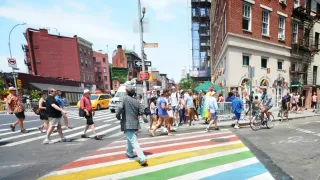
5 hours ago
Massachusetts Foster Parents Lose License Over Refusal to Affirm LGBTQ+ Protections
READ TIME: 4 MIN.
A series of recent cases in Massachusetts have thrust the state's foster care system into the national spotlight, after several foster parents had their licenses revoked for refusing to sign an agreement to support, respect, and affirm the sexual orientation, gender identity, and gender expression of children in their care. The controversy underscores the complex intersection of religious liberty, anti-discrimination protections, and the needs of vulnerable LGBTQ+ youth .
The Massachusetts Department of Children and Families (DCF) updated its policy in 2022, requiring foster parents to sign a non-discrimination agreement. The policy explicitly states that foster families must "support, respect, and affirm the foster child’s sexual orientation, gender identity, and gender expression" . This affirmation includes using a child’s chosen name and pronouns and supporting gender-neutral practices regarding clothing and appearance.
DCF’s policy is rooted in efforts to protect LGBTQ+ youth, who are overrepresented in foster care and face heightened risks of homelessness, mental health challenges, and discrimination. Nationally, studies have shown that about 40% of foster youth who have run away or been kicked out of their homes identify as LGBTQ+, and LGBTQ+ foster youth are three times more likely to attempt suicide compared to their non-LGBTQ+ peers .
Polly Crozier, Director of Family Advocacy at GLBTQ Legal Advocates and Defenders, explained, “The state has an obligation to children to make sure that they're safe and well protected. Foster parents…are a stop gap to make sure children can safely go back to their families of origin” .
Among those affected are Lydia and Heath Marvin of Woburn, Massachusetts, who fostered eight children under the age of four since 2020. The Marvins lost their license in April 2025 after declining to sign the DCF’s LGBTQIA+ Non-Discrimination Policy, citing their Christian faith as the reason for their refusal. “We will absolutely love and support and care for any child in our home but we simply can't agree to go against our Christian faith in this area,” said Lydia Marvin .
Similar cases have emerged involving other families, including Audrey and Nick Jones of Worcester County and Greg and Marianelly Schrock of Middlesex County. Both couples are now plaintiffs in a federal lawsuit filed by the Massachusetts Family Institute and Alliance Defending Freedom against DCF, alleging violations of their First Amendment rights to religious exercise and free speech .
The lawsuit claims that DCF's policy forces parents to accept and affirm a child’s LGBTQIA+ identity, address children by their chosen names and pronouns, and support gender-affirming practices. The families argue that this requirement is an unconstitutional condition for licensure and forces them to act against their religious beliefs .
The legal dispute in Massachusetts comes amid a nationwide debate over the balance between religious liberty and anti-discrimination protections, particularly in the context of foster care and adoption. Similar cases have appeared in other states, and the issue has drawn attention from federal officials. Last week, the Trump administration’s Acting Assistant Secretary for the Administration for Children and Families sent a letter to DCF, criticizing the policy as “deeply troubling” and “in direct violation of First Amendment protections” .
Religious liberty organizations representing the plaintiffs have argued that the state is prioritizing ideology over children’s needs at a time of foster parent shortages. “Massachusetts’ foster care system is in crisis: The commonwealth has more than 1,400 children who are waiting to be placed with a loving family. Yet Massachusetts is putting its ideological agenda ahead of the needs of these suffering kids,” said Johannes Widmalm-Delphonse, senior counsel for Alliance Defending Freedom .
However, LGBTQ+ advocates and many child welfare professionals emphasize that the primary concern must be the well-being and safety of children in state custody. Tanya Neslusan, executive director of MassEquality, stated, “When you are parenting children, it is never about the parents — it is about the children and making sure that their needs are prioritized. And if you can’t in good conscience do that, then that’s really what it comes down to” .
Attorneys for the state maintain that as a government-run system, Massachusetts has the authority—and responsibility—to establish standards that protect the emotional and psychological safety of children in foster care. Josh Gupta-Kagan, a Columbia Law School professor, remarked, “Because it’s a state-run system, the state has to have some leeway to make some decisions about ... what it means to keep a child emotionally safe and healthy while that child is in state custody” .
The outcome of the ongoing lawsuit could have broad implications for foster care policies nationwide, potentially shaping the standards for balancing religious freedom and anti-discrimination protections in state-regulated child welfare systems.
LGBTQ+ organizations and advocates have expressed concern that weakening these non-discrimination protections would expose vulnerable youth to further harm. Research consistently shows that LGBTQ+ youth fare better in affirming environments and that lack of acceptance at home is a major driver of negative health outcomes, including increased rates of depression and suicide attempts .
Policymakers and advocates argue that the state’s policy is not about promoting a particular ideology, but about ensuring that all children in state care are treated with dignity, respect, and acceptance, regardless of their identity.
As court proceedings continue, the debate in Massachusetts is likely to resonate in other states grappling with similar challenges. For now, the state’s position remains clear: foster parents must agree to support and affirm the identities of all children in their care in order to be licensed. The broader legal and ethical questions raised by this case are poised to shape child welfare practices and LGBTQ+ protections for years to come.






